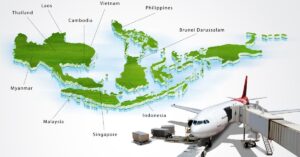Amidst the turbulence of the US-China trade war, the Association of Southeast Asian Nations (ASEAN) has emerged as a critical player in mitigating its disruptive effects. Leveraging their unique position, ASEAN countries have managed to navigate this complex geopolitical landscape, capitalizing on trade opportunities and promoting regional stability. This paper explores the multifaceted role of ASEAN in addressing the repercussions of the trade war, drawing from a diverse range of academic sources to support its analysis.
As the world’s two largest economies, the United States and China have wielded significant influence on global trade and investment flows (Liao & McDowell, 2019). The escalating tensions between these superpowers have generated ripple effects across the globe, with ASEAN being no exception. However, this dynamic region has managed to adapt and thrive, in part due to its strategic position at the crossroads of the global economy (Petri et al., 2018).
Firstly, the redirection of trade and investment has created new opportunities for ASEAN nations. As companies seek to diversify their supply chains and reduce exposure to trade barriers, ASEAN has emerged as an attractive alternative destination for manufacturing and sourcing (Amiti et al., 2019). This shift has spurred economic growth in the region and allowed member states to capitalize on their comparative advantages.
In addition, ASEAN’s diplomatic efforts have played a vital role in maintaining regional stability. By fostering dialogue and cooperation among its members, the organization has been able to present a unified front in the face of global challenges (Vuving, 2020). Through initiatives such as the Regional Comprehensive Economic Partnership (RCEP), ASEAN has encouraged trade liberalization, ultimately facilitating economic integration and reducing the region’s reliance on any single trading partner (Urata, 2021).
Furthermore, ASEAN’s pursuit of multilateralism has contributed to its resilience during these challenging times. Engaging with both the US and China in various forums, the association has successfully balanced its relationships with the competing superpowers, ensuring that the region is not solely dependent on either party (Severino, 2019). This pragmatic approach has allowed ASEAN to act as a stabilizing force in the midst of the trade war.
In conclusion, ASEAN has adeptly navigated the US-China trade war, mitigating its fallout by capitalizing on economic opportunities and promoting regional stability. The organization’s ability to adapt and maintain strategic relationships with both superpowers underscores its importance in the global geopolitical landscape. As the trade war continues to evolve, ASEAN’s role in managing its consequences will only grow in significance.
References:
- Amiti, M., Redding, S. J., & Weinstein, D. E. (2019). The impact of the 2018 trade war on US prices and welfare. Journal of Economic Perspectives, 33(4), 187–210. https://doi.org/10.1257/jep.33.4.187
- Liao, S., & McDowell, D. (2019). No reservations: International order and informal economic power in global financial governance. International Studies Quarterly, 63(4), 848–862. https://doi.org/10.1093/isq/sqz065
- Petri, P. A., Plummer, M. G., & Zhai, F. (2018). Adding Japan and Korea to the TPP: Implications for Regional Integration in Asia and the Pacific. Pacific Economic Review, 23(1), 3-29.
- Severino, R. C. (2019). ASEAN: The way forward. ISEAS Perspective, 2019(28), 1–11. https://www.iseas.edu.sg/wp-content/uploads/2019/05/ISEAS_Perspective_2019_28.pdfAsia Policy, 14(1), 58-66.
- Urata, S. (2021). The Regional Comprehensive Economic Partnership (RCEP): Significance, challenges, and prospects. Asia-Pacific Review, 28(1), 37–53. https://doi.org/10.1080/13439006.2021.1936976
- Vuving, A. L. (2020). Power in the 21st century: The characteristics of asymmetry. In Vuving, A. L. (Ed.), Hindsight, insight, foresight: Thinking about security in the Indo-Pacific (pp. 17–35). Daniel K. Inouye Asia-Pacific Center for Security Studies. https://apcss.org/hindsight-insight-foresight-thinking-about-security-in-the-indo-pacific/











